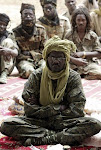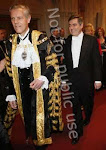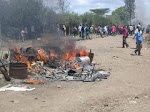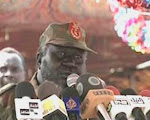You can only govern men by serving them. The rule is without exception – Victor Kiam
In the previous feature, "Integral" observed the values or pillars of democracy: sovereignty of the people; government based upon consent of the governed; majority rule; minority rights; guarantee of basic human rights; free and fair elections; equality before the law; due process of law; constitutional limits on government; social, economic, and political pluralism; values of tolerance, pragmatism, cooperation, and compromise, http://usinfo.state.gov/products/pubs/whatsdem/whatdm2.htm).
The readers who, for a reason or more, took democracy for granted would realise that there is truly more into democracy than meets the naked eye. Thus, to be fair to the argument that 'the shortage in desire or need to accept or welcome the tenets, doctrines, ethics or dogmas of democracy is the most serious cause of disunity in South Sudan', the above-mentioned values or pillars of democracy should really be looked at one by one and seen whether or not they are applied by SPLM/A and GoSS to enhance unity in South Sudan. "Integral" has already looked at the "Sovereignty of the People."
The second pillar of democracy, which is the feature of today, means that any government claiming to be democratic should be based on the consent of the governed – the people. It literally means that there is absolutely nothing that affects the lives of people which the government (legislature and executive) could or can do without the consent or agreement of the governed.
Relating this to South Sudan and GoSS situation in particular, it would only be fair to ask a few questions so as to understand whether or not the GoSS is entirely based upon the consent of the governed. Before asking such questions, however, it would be mature enough to think for those who would argue for and against this thinking that the GoSS needs the consent of anybody to function.
There are those who say GoSS is empowered by the CPA and the CPA were negotiated by the peoples' representatives and thus GoSS is based upon the consent of the governed. Others simply say that the CPA is a property of SPLM/A only and that is why SPLM/A took 70 and gave the people 30 percent of power sharing in South Sudan. "Integral" agrees with the notion that the CPA was negotiated by the peoples' representatives, imposed or otherwise; and that GoSS is based upon the consent of the governed. However, it is those that "Integral" agrees with who actually are causing disunity in South Sudan by contradicting themselves every now and then. Sometimes they say one thing and their actions would reveal another.
These are the South Sudanese members of SPLM/A who find it so difficult to differentiate between SPLM/A, GoSS and themselves as part of the populace in South Sudan. These few individuals (hereinafter referred to as 'notorious individuals'), by their continued actions, reveal that the GoSS was and remains the result of a hard-fought liberation struggle and so needs no consent from anyone to function. These notorious individuals are also supported by some individuals they use as conduits to channel their notoriety to the states. They and their conduits say 'GoSS and they are there to stay whether anyone likes it or not.' These notorious individuals have gone as far as saying that: 'we got it trough the barrel of the gun and thus no one can take it through a ballot box.' The missing link here could be the difficulty to understand the concept of 'governed.'
But these notorious individuals know that the South is not their property or entrepreneur in order for them to risk profit-making. GoSS is and will remain to be the government of the people and for the people of South Sudan.
It was earned through a protracted struggle in which lives of great sons and daughters of South Sudan were sacrificed not from the yester days only but from time immemorial.
However, there is one thing which is relieving in all these: the agreement of the majority in South Sudan which identifies itself with the CPA which they believe gave birth to GoSS. This will also mean that this majority too agrees that the GoSS is based upon the consent of the governed because it was negotiated by the peoples' representatives. But how much legislation has the South Sudan Legislative Assembly (SSLA) debated upon and passed on behalf of the governed? How much of those legislation were made with the consent of the governed? Did the legislation made require the consent of the governed? Did the SSLA at one point in time of its existence ever requested recess to get the consent of the governed when faced with some tougher legislation?
What about the executive – that is GoSS? Has it ever taken the people – the governed – into consideration when dealing with matters that concern them? How many times have the people in the South complained about one or two executive decisions that affected their lives? How many times has GoSS intervened in the very many cases that directly affected the lives of the governed in South Sudan?
The same questions would apply to the State legislative assemblies and state executives or cabinets throughout the ten states in South Sudan.
Those notorious individuals who see themselves as the South and the South as they would not hesitate to say: 'well, the GoSS was not elected after all and so to hell with the consent of the governed!' This statement, however, would negate the fact that the Comprehensive Peace Agreement (CPA) came as a direct result of the peoples' struggle. It would also negate the fact that there was a struggle meant to liberate the people of South Sudan from the yolk of the oppressor. Looking at it from an exactly opposite dimension, one would clearly see that the purported struggle – in the understanding of these notorious individuals – meant to replace what was called 'Arab oppression' by their oppression. This would be devastating to the general idea of liberation, which is selfless and means sacrifice on behalf of the oppressed.
A government based upon the consent of the governed is one which looks at the people as the main reason for its existence. In other words, a government based on the consent of the governed cannot work contrary to the peoples' needs but rather for their general good.
"Consent of the governed" is based on a political theory by an English political scientist, John Locke. The founders of the United States believed in John Locke's political theory of a state built upon the consent of "free and equal" citizens; a state otherwise conceived would lack the legitimacy and the authority to exercise legal authority stating that a government's legitimacy and moral right to use state power are, or ought to be, derived from the people or society over which that power is exercised.
The GoSS under the leadership of SPLM/A has to realise that there are no shortcuts to a leadership that would last forever. The only way to prolong leadership, since there is no such thing as lasting leadership, is to govern with the consent of the governed. To encourage a government that is based upon the consent of the governed would also encourage the promotion of unity of the people. This indeed is the aim of this column: to encourage the unity of the people of South Sudan so that they could speak in one voice whenever necessary.







No comments:
Post a Comment